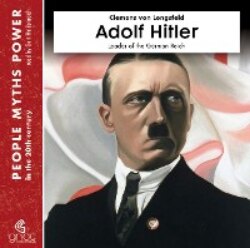Читать книгу Adolf Hitler - Clemens von Lengsfeld - Страница 14
На сайте Литреса книга снята с продажи.
ОглавлениеThe muffled furore
Historical research has still today not explained unequivocally when Hitler’s enmity towards the Jews started and what caused this. As in legal cases there does exist an overwhelming body of evidence, but the conclusive and convincing piece evidence is not there. We only know when the finished anti-Semite was there. He neither become such in his time in Vienna under the influence of Jewish life in the Austrian capital – at the start of the 20th century there were 150,000 Jews living in Vienna – nor was it the result of his war experiences, thus born of the defamatory and increasingly rampant view that the German Empire had only lost the war because the Jews had first of all poisoned the people from within and then betrayed them. What is certain is that Hitler, later the top official in the NSDAP, was still not an ideological anti-Semite and racist up to 1918. What he did do, however, was to repeat parrot-fashion, without reflecting, the prevailing barroom chatter of the right-wing press and nationalist politicians. The military, which dominated public opinion, had also underpinned this through the “knife-in-the-back myth” it had propagated. This was released into the world shortly before the imminent defeat in order to deflect the blame from those responsible. In this the talk was of an army undefeated at the front, attacked from behind by the homeland through peace initiatives, left-wing political agitation, strikes and acts of sabotage. Hitler first saw the pamphlets of German nationalist publishers in Munich, who blamed the defeat in the war on the Jews as they were said to have taken advantage of the German soldiers through their avarice, warmongering, nepotism and shirking their duty at the front.40 These pamphlets of course did not mention the series of diplomatic failures on the part of the German Kaiser, Wilhelm II, his unfortunate naval arms race with Great Britain and his jingoism backed by military leaders along the lines of “Deutschland, Deutschland über alles”. The real inflammable material for a population worn down by wartime winters, starvation41 and impoverishment was provided by slogans about Jewish war profiteers, who were said to have earned billions through the wartime economy.
They were also said to have staged the revolution, which in reality was started by the sailors in Kiel in November 1918 and then spread to the rest of the country at lightning speed, in order to deflect attention from the actual causes.
German ideology was never free of a certain fundamentalism, which was characterised by a deep longing for a national identity and, at the same time, resisted foreign ideas and ways of life. The idealisation of rural idylls and of a purely natural life far away from destructive civilisation was a recurring theme that had already achieved significance in the German Romantic period. From its outset German nationalism had also nurtured a phobia against Jews. That economic and political facts, which threatened the old elites and their sinecures respectively, could so easily and without question have been covered up with hostile anti-Semitic explanations, strengthened their influence.
On 21 February 1919 the socialist Bavarian Prime Minister was assassinated. The bloody deed was committed by an anti-Semitic right-wing fanatic, Anton Graf von Arco auf Valley, and triggered a wave of violence from both left and right. The government legally elected after Eisner’s assassination under the Social Democrat Johannes Hoffmann could not hold on for long. It saw itself threatened by a leftist revolutionary council, which rejected collaboration with the despised Berlin “Ebert–Scheidemann–Noske–Erzberger” government and ultimately claimed power for itself. Shortly afterwards, on 7 April 1919, the “Bavarian Soviet Republic” was declared and Hoffmann fled to Bamberg together with his cabinet. From there he now beseeched Gustav Noske, in his role as Reich Defence Minister, to send armed troops to Munich. Noske, who was later given the self-explanatory name “Bloody Noske”, was determined to put an end to this “Carnival of Madness”42 with all the arbitrariness at his command. This he ultimately succeeded in, and did so brutally, with the aid of militia and Reichswehr units. One month after the Munich blood bath the military were in charge there before Hoffmann returned to his office in August 191943. He was however only to hold it until his retirement in March 1920. The reactionary forces of the nobility were at the same time ranked against the extreme left. Now it was the turn of the counter-revolutionaries from the right-wing corner, the von Kahrs, the von Lossows and those from the von Knilling clan, who ganged up and took over control of Bavaria in March 1920. In the circle around their national conservative Prime Minister, Gustav Ritter von Kahr, they brandished big speeches: “We don’t mean: Leave Berlin! We are not separatists. For us this means: off to Berlin! For two months we have been lied to by Berlin in an unbelievable manner. But nothing else is to be expected from this Jewish government at the head of which is a mattress engineer. I said at the time: in Berlin everything has been screwed up by Ebert, and I also maintain that today.”44 The author of these words, Baron von und zu Aufsess, for once, exceptionally, did not use the disrespectful term of saddler’s apprentice – Ebert had served an apprenticeship as a saddler – but, by vilifying Prime Minister Ebert with the term “mattress engineer”, he was trying to improve his own position. In the “Free State of Bavaria” one viewed the Berlin government of the Reich with complete contempt.
